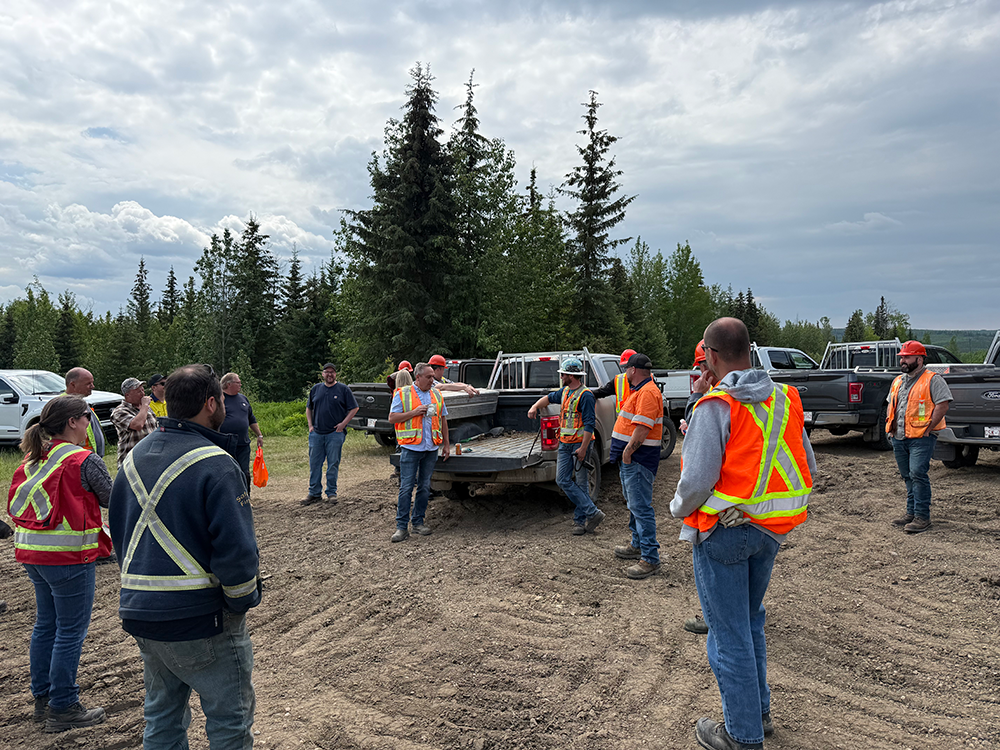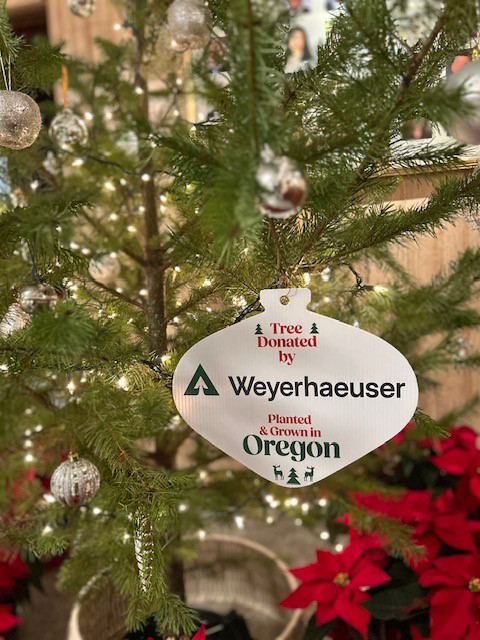
Paul Hossain, senior vice president and chief development officer (fourth from left), participates in a discussion about the role of nature-based solutions in scaling resilience and adaptation opportunities during a panel hosted by Barclays on Sept. 23.
For the third consecutive year, members of our Corporate Development organization were among the thousands who traveled to New York City last month for one of the world’s largest and most important climate gatherings, Climate Week NYC. The annual event overlaps with the United Nations General Assembly and serves as an opportunity for leaders in the public and private sectors to raise awareness and engage in important conversations around the global response to climate change. More than 1,000 official events were held across the city from Sept. 21 to 28, making this year’s Climate Week NYC the largest in its 16-year history. Weyerhaeuser’s contingent — including Paul Hossain, senior vice president and chief development officer; Alicia Robbins, vice president, Natural Climate Solutions and Business Development; Ara Erickson, vice president, Corporate Sustainability; and Vaughan Andrews, senior manager, sustainability — were in the middle of the action, traversing the city to participate in more than a half dozen formal speaking opportunities and countless other meetings, forums and networking events in support of our business and sustainability objectives.
While the takeaways from Climate Week NYC are different every year, our team returned feeling encouraged by the interest and attention that nature-based solutions and forests received across the diverse events we attended.
“It was clear from our interactions that there’s still significant and growing demand from companies to participate in the voluntary carbon market, and increasingly that demand is for high-quality credits,” says Paul, who participated in a roundtable discussion hosted by the World Business Council for Sustainable Development on Sept. 22. “We’ve recognized the importance of quality for a long time and even published the Carbon Credit Principles that guide our approach shortly after our first trip to Climate Week NYC in 2023. But it was good to have an opportunity to reiterate our commitment to developing high-integrity projects that attract private-sector investment and scale the VCM.”
Ara Erickson, vice president, corporate sustainability (right), shares her optimism for the future of forests and forestry at the Forest Restoration Leadership Forum on Sept. 23.
Alicia had a similar opportunity during a panel we co-hosted with our partners at Carbon Direct on Sept. 25 that brought together industry leaders and corporate buyers for a discussion about how forest carbon projects — including the Improved Forest Management (IFM) projects we’re developing, starting with our first in Maine — can meet the urgent need for scalable, nature-based carbon removals.
Our team also appreciated how nature-based solutions and forests were included in many conversations about resilience and adaptation.
“We know nature-based solutions — and especially forests — are the most readily available and scalable tool we have for mitigating climate change, but they can also help businesses and communities become more resilient and adaptive as the climate changes,” Alicia says.
Paul also explored this topic during a panel hosted by Barclays on Sept. 23 and explained how Weyerhaeuser, as responsible stewards of millions of acres of forestland, recognizes our interdependence with nature and works to anticipate how climate change might affect our forests so that we can build mitigation efforts into our plans to sustainably manage them. We outlined our nature-related dependencies, impacts, risks and opportunities in our Nature Perspective discussion paper last December. Our broad appreciation for the many benefits forests provide also was a theme for Ara during her participation in the Forest Restoration Leadership Forum on Sept. 23.
Vaughan Andrews, senior manager, sustainability (left), leads a discussion about carbon accounting during a panel we co-hosted at The Nature Hub on Sept. 24.
Climate Week NYC provides an excellent opportunity for high-level industry discussions, and several important gatherings took place this year around greenhouse gas accounting. Weyerhaeuser has been a leader in establishing best practices for developing a GHG inventory that accurately and transparently accounts for working forests and the long-lived wood products that come from them. We published our approach in our Greenhouse Gas Inventory Principles at Climate Week NYC last year, and Vaughan had an opportunity to highlight them again this year during a panel we hosted at The Nature Hub on Sept. 24.
That same day, we joined the Task Force for Corporate Action Transparency in its launch of two GHG accounting frameworks. Weyerhaeuser is one of several companies testing the new initiative, which gives companies more flexibility to provide a complete picture of their decarbonization journeys. We have an abiding interest in ensuring forests are fully and appropriately represented in GHG accounting frameworks and joining this pilot test signals our support for practical guidance that recognizes working forests as an important component of high-integrity climate action, disclosure and transparency.
Alicia Robbins, vice president, Natural Climate Solutions and business development (left), discusses the role of nature-based solutions in supporting climate resilience and sustainable development at the World Climate & Biodiversity Summit on Sept. 25.
In addition to the above events, Alicia joined a panel discussing the holistic climate solutions provided by forests at the World Climate & Biodiversity Summit that took place alongside Climate Week NYC, and Ara participated in a sustainability forum hosted by Goldman Sachs where the water filtration benefits of forests were highlighted.
“As the largest private owner of timberland in the U.S., Weyerhaeuser has a unique opportunity to deliver natural climate solutions across our land base, unlock the full potential of our working forests and create a more sustainable world for future generations,” Alicia says. “As we look forward to next year, we encourage all who care about the future of forests — and the health of our planet — to join us in calling for greater recognition of all the benefits forests provide. When we invest in high-quality carbon credits, build with sustainable wood products or use renewable bioenergy, we create demand across the entire forest economy and ensure that our forests stay forests and continue delivering the very benefits we spent the week in New York discussing.”

